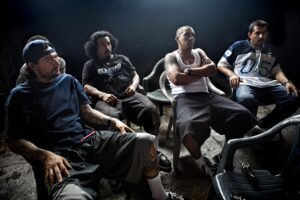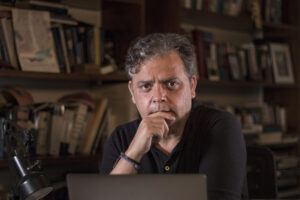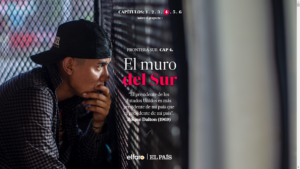This story was originally published by the Global Investigative Journalism Network (GIJN) under a CC BY-NC 4.0 license and has been republished here with permission.

Members of the MS-13 gang in the Ciudad Barrios Prison in San Miguel, in a 2012 photo. Photo: Pau Coll Ruido / Courtesy of El Faro
Drones flying by the windows of the director’s home, suspicious cars following journalists, death threats, four financial audits, fake criminal charges, and phone line interceptions. The editors of El Faro, one of the leading journalism organizations in El Salvador and the region, say these are all part of a recent barrage of attacks unleashed on the digital newspaper.
Since 1998, El Faro has fought a gutsy battle for accountability in this country of 6.5 million people in Central America, bordered by Guatemala and Honduras. El Salvador is saddled with stubborn poverty, a history of civil conflict, and pervasive criminal gangs, with the highest per capita homicide rate in the world.
But after decades of investigating criminal organizations, corruption in various governments, and illegal practices by security forces, the newspaper might be facing one of its greatest challenges yet in Nayib Bukele, El Salvador’s president since 2019. Bukele expelled El Faro’s editor Daniel Lizárraga from El Salvador (he is a Mexican national); denied a work permit for journalist Roman Olivier Gressier (an American in El Faro’s English division); and labeled the award-winning news site a “pamphlet” without “an iota of credibility.”
Bukele, who at 39 is dubbed by some media outlets as the “Millennial President,” conducts press conferences wearing leather jackets and baseball caps turned backward and made his country the first where Bitcoin can be used alongside the official currency, the US dollar.
While Bukele cultivates a fashionable, hip image, and frequently appears on international platforms — he announced Bitcoin as a Salvadorian currency at an English-language conference in Miami — critics say that he has taken a sharp turn towards authoritarianism at home. He used his party’s parliamentary majority to eliminate the constitutional chamber from the Supreme Court — thus weakening one of the few bodies able to oppose him, replaced the state prosecutor with someone that El Faro says is a sympathizer and, his opponents allege, has intimidated the judiciary branch into toeing the government’s line.

El Faro’s founder and director, Carlos Dada. Image: Víctor Peña/ Courtesy of El Faro
“I have no trust in state institutions to protect our rights or conduct lawful procedures,” says Carlos Dada, the founder and director of El Faro. “The Minister of Labor publicly threatened the judges of two cases with opening investigations against them if they did not give the ruling the government wanted. These cases aren’t against us, but this gives you an idea of how things are right now in El Salvador.”
In the years before he was sworn in as president, Bukele praised El Faro’s investigations against his political opponents. His attitude changed when, in September 2020, the newspaper published an exposé alleging that members of Bukele’s administration had made political deals with the Mara Salvatrucha (MS-13), El Salvador’s largest and most feared criminal gang.
“Almost as soon as Bukele became president, he began talks and meetings with leaders of the MS-13, whose relations he had been cultivating since he was mayor of the capital, San Salvador,” explains Carlos Martínez, an award-winning journalist and El Faro’s lead investigator, who was part of the team that worked on the exposé.
El Faro obtained the official log books recording entries into El Salvador’s maximum-security prisons. On several occasions, they reported, a member of Bukele’s government entered the prison alongside masked men to hold meetings with imprisoned leaders of MS-13.
They later acquired internal prison intelligence memos, which stated the masked visitors were actually high-ranking members of the MS-13 gang, who were conferring with their bosses inside. Finally, the team obtained the transcript of what was said in those meetings. All of these official documents were given to El Faro by a whistleblower within the intelligence community.
The El Faro investigation alleged that Bukele’s administration had made a series of concessions to the gang in order to win electoral support in MS-13 territory and to try and reduce the country’s homicide rate.
The government denied the claims, and President Bukele attacked the news site on Twitter, but the story made international headlines. Ten hours after the investigation was published, the government invited journalists into one of the prisons mentioned in the article to conduct interviews with inmates. Any prisoner, the government said, would deny El Faro’s claims.
But El Faro has staunchly defended its investigation, and Martínez says that ever since, the president conducts regular polygraph tests among the employees of the presidential palace, asking if they have any contact with the journalists of El Faro.
The investigation showed that notwithstanding Bukele’s enormous popularity — which at the time was 92% according to polls — El Faro would maintain absolute independence from any political movement, and would continue speaking truth to power.
Lighting the Way for Journalists
El Faro — which means The Lighthouse in Spanish — was the first Latin American digital newspaper. It was founded in 1998 by Dada, a journalist, and Jorge Simán, an entrepreneur, in the wake of the country’s 1992 peace accords, which followed 12 years of civil war.
“At that time, we still lived in what I call the honeymoon after the peace accords,” recalls Dada. “There was a generational change in newsrooms and several spaces of public discourse. The war generation gave way to the post-war generation.”
El Faro, which is run by the media company Trípode S.A. de C.V., began as a digital newspaper because of financial constraints. The founders’ original goal was to move into print, but this never happened. The early focus on digital turned out to be a blessing, allowing the team to concentrate on journalistic content and the sound management .
Key to their success has been El Faro’s investigative teams, set up with the aim of digging into important regional crime and human interest stories. Reporters focus on a particular topic for a number of years, giving them time to unearth core material and recruit important sources.
In 2008, Martínez says, “we set up a team in Mexico with the sole task of reporting on the route taken by undocumented Central American migrants into the United States.” “Journalism had mostly focused on migrants in the US, but never on the cruel journey through Mexico. This model worked so well that we then created a group of journalists with the mandate of explaining the inner workings of violence in the region.”

The Southern Wall, or El muro del Sur, is one of El Faro’s investigations into migration in Central America. Image: Screenshot
After a series of devastating civil wars, El Salvador and its Central American neighbors enjoyed only a short period of calm before criminal gangs moved in to occupy the places the state was unable or unwilling to reach. In the urban slums, organized crime became a brutal parallel power that overshadowed the state’s capabilities.
The violence project was designed to look at what was happening with different beats: organized crime, penitentiaries, gangs, and the normalization of violence. The team was dubbed Sala Negra — the Black Chamber — and from 2010 to 2016 it conducted more comprehensive work on Central American gangs than anyone had published before. For the first time, reporters managed to narrate this phenomenon from the perspectives of gang members, by earning their trust and interviewing them.
“By focusing on this single phenomenon, we were able to explain the origins of the gangs, the way they evolved, and the public policies that permeated them,” says Martínez. “We were able to penetrate these criminal structures and collect the stories they told about themselves. We explained their internal conflicts and the passage of narcotics in the region. We revealed Central American drug cartels that weren’t known, and we explained how violence in the region was used by politicians as a mechanism that generated votes.”
Sala Negra’s investigative methods, and El Faro’s more widely, have usually followed the classical, and effective, reporting technique of immersion in a given area. Their model tries to supply the journalists with the tools necessary to uncover complex answers, allow the reporters time to build up strong rapport with sources, and present the investigations in a narrative form to better connect with the audience.
Marcela Turati, an award-winning Mexican journalist renowned for her work on forced disappearances, has closely followed El Faro’s work. The team’s narrative style, she says, is “impressive, while also being very rigorous. This is one of their distinguishing features.”
Expansion
The long list of prizes awarded to El Faro and its journalists include some of the most prestigious in the US and the Spanish-speaking world, including the Maria Moors Cabot Prize, the Hillman Prize, the Ortega y Gasset Prize, and the Rey de España Award.
As a way to highlight the team-driven work conducted by the outlet, the Gabo Foundation, which supports and promotes journalism in Latin America and Spain, awarded its 2016 Journalism Excellence Award to the team. It was the first time the prize had gone to an entire media organization.
This collaborative process has been crucial to El Faros’ success. Teams of five to 10 people design each investigative project, agreeing on which topics they’ll cover, and find institutions to finance the work. Besides the articles they post online, the teams also produce books, documentaries, and podcasts, and recently released “Unforgivable,” a documentary co-produced with La Jaula Abierta (The Open Cage) about sexual diversity among imprisoned gang members in El Salvador.
“El Faro never conducts investigations according to what financiers want,” explains Martínez. “Once we know what we want to investigate, we proceed to look for those willing to finance the projects.” Donors acknowledged on its web page include the Open Society Foundations, Heinrich Böll Stiftung San Salvador, Free Press Unlimited, and The Fund for Global Human Rights. El Faro is also a member of the Global Investigative Journalism Network.
El Faro has also sought support through a crowdfunding campaign that alludes to how its form of “uncomfortable” investigative journalism is not afraid of investigating corruption. Similar to a subscription, readers and supporters can make donations of $2 to $20 as a one-off, or on a monthly basis.
A key element to El Faro’s success has been how it has made a name for itself across the region. Martínez is currently designing the team’s latest investigative project, and while the details cannot be revealed yet, he says it will feature investigative work across several countries.
El Faro also hosts the Foro Centroamericano de Periodismo (Central American Journalism Forum), a yearly event that brings together some of the best journalists in the world to train and share experiences with those in the region. The Forum has also produced collaborative work with other news outlets around the world, among them an investigation into the southern Mexican border (with Spain’s newspaper El Pais), and a report on Central American refugees (with Univision, a top US Spanish-language television network).
The latest expansion took place last year when El Faro launched an English-language edition to broaden its reach in the US. A team of native English-speaking journalists works on stories related to Central America under the leadership of José Luis Sanz in Washington, DC.
“El Faro is motivated by being relevant and generating impact in public discourse, and what happens in the US is extremely important for the region,” says Sanz, adding that around 20% of the site’s readers are now based in the US.

Journalist María Luz Nóchez, one of the El Faro reporting team. Photo: Víctor Peña. Courtesy of El Faro
There have been other innovations, too. A new committee, led by journalist María Luz Nóchez, is evaluating the diversity and inclusion policies of El Faro, and training journalists to write from a gender-sensitive perspective.
One of the stories that came about as a result — an investigation into how 90% of child rape cases in El Salvador go unpunished — earned Nóchez and Laura Aguirre the Latin American Investigative Journalism Award (COLPIN).
“Gender is now a topic that is covered more doggedly,” says Nóchez. “Even though we worked on these topics before, since 2016 we have put more emphasis on it.”
The Coming Storm
“What I’m most enthusiastic about going into the future is consolidating as a Central American, and not just Salvadorian, media outlet,” says Dada, although he admits that, due to the harassment El Faro faces, “the future is uncertain.”
There is reason for concern. Outside El Salvador, the media climate in the region is increasingly hostile. While Bukele tightens the screws on press freedom in El Salvador, leftist President Daniel Ortega of Nicaragua has forced journalists into exile. Mexico is the most dangerous country in the Western hemisphere for the press, where according to the Committee to Protect Journalists, reporters face “a complex web of criminal, drug-trafficking gangs and entrenched official corruption.” In Latin America more widely, journalists in Ecuador, Venezuela, Bolivia, and Cuba have faced judicial harassment, expulsion, and imprisonment.
“The risks we faced before [such as death threats] were because of doing our jobs,” observes Dada. “They were risks that come with the work we did. The risk we face now is the danger of not being able to do our work.”
In February 2021, the Inter-American Commission on Human Rights — part of the Organization of American States — ordered the Salvadoran state to take precautionary protective measures in relation to the 34 journalists and managers that make up El Faro’s staff. On June 23, Dada told a hearing that the government had failed to provide any of the required protective measures.
“It is impossible to think that we will be silent or not do our work,” says Martínez. “We have colleagues in other countries that have had to face more difficult, longer, and darker situations, and they have remained firm in their duty. They understood journalism is not an accessory, but a fundamental pillar in the construction of just, correct, and decent societies. That is also how we understand the work we do.”